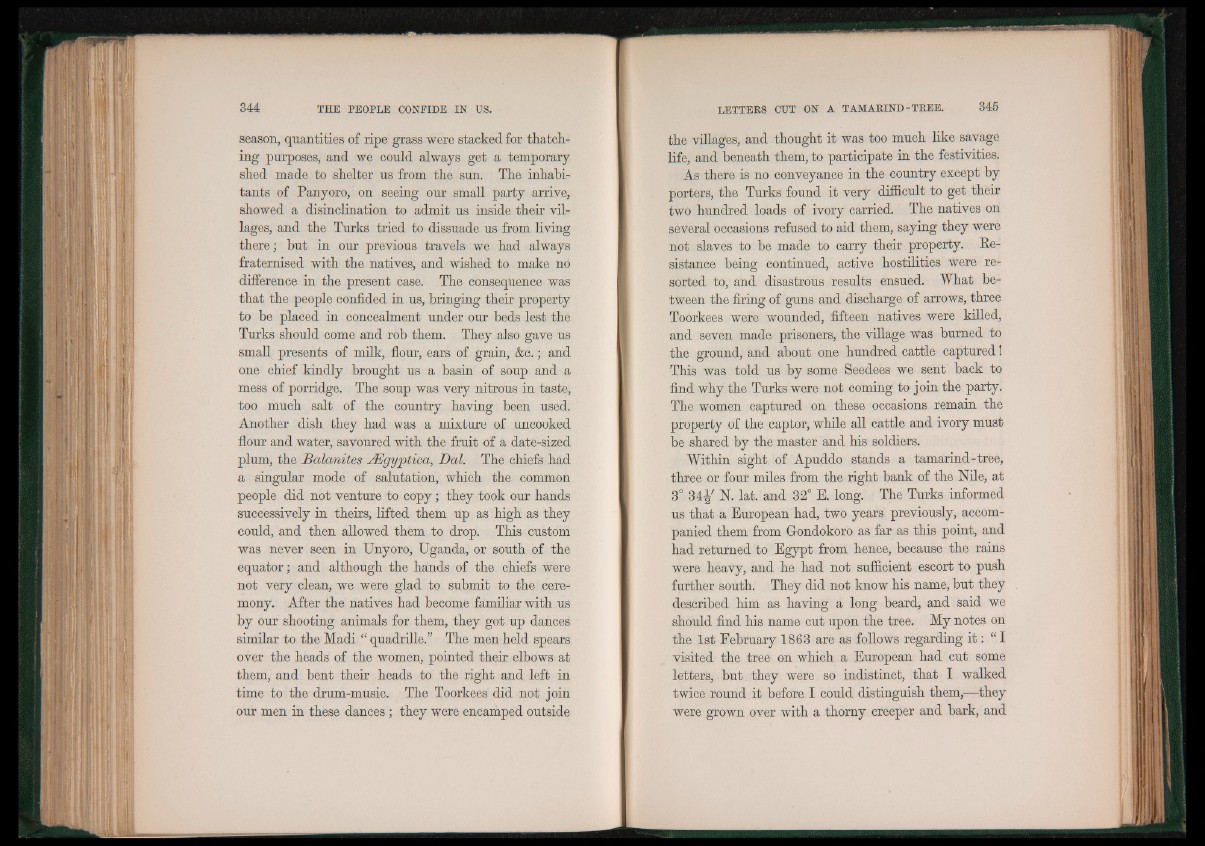
season, quantities of ripe grass were stacked for thatching
purposes, and we could always get a temporary
shed made to shelter us from the sun. The inhabitants
of Panyoro, on seeing our small party arrive,
showed a disinclination to admit us inside their villages,
and the Turks tried to dissuade us from living
there; but in our previous travels we had always
fraternised with the natives, and wished to make no
difference in the present case. The consequence was
that the people confided in us, bringing their property
to be placed in concealment under our beds lest the
Turks should come and rob them. They also gave us
small presents of milk, flour, ears of grain, &c.; and
one chief kindly brought us a basin of soup and a
mess of porridge. The soup was very nitrous in taste,
too much salt of the country having been used.
Another dish they had was a mixture of uncooked
flour and water, savoured with the fruit of a date-sized
plum, the Balanites AEgyptica, Dal. The chiefs had
a singular mode of salutation, which the common
people did not venture to copy; they took our hands
successively in theirs, lifted them up as high as they
could, and then allowed them to drop. This custom
was never seen in Unyoro, Uganda, or south of the
equator; and although the hands of the chiefs were
not very clean, we were glad to submit to the ceremony.
After the natives had become familiar with us
by our shooting animals for them, they got up dances
similar to the Madi “ quadrille.” The men held spears
over the heads of the women, pointed their elbows at
them, and bent their heads to the right and left in
time to the drum-music. The Toorkees did not join
our men in these dances; they were encamped outside
the villages, and thought it was too much like savage
life, and beneath them, to participate in the festivities.
As there is no conveyance in the country except by
porters, the Turks found it very difficult to get their
two hundred loads of ivory carried. The natives on
several occasions refused to aid them, saying they were
not slaves to be made to carry their property. Resistance
being continued, active hostilities were resorted
to, and disastrous results ensued. What between
the firing of guns and discharge of arrows, three
Toorkees were wounded, fifteen natives were killed,
and seven made prisoners, the village was burned to
the ground, and about one hundred cattle captured!
This was told us by some Seedees we sent back to
find why the Turks were not coming to join the party.
The women captured on these occasions remain the
property of the captor, while all cattle and ivory must
be shared by the master and his soldiers.
Within sight, of Apuddo stands a tamarind-tree,
three or four miles from the right bank of the Nile, at
3° 34^' N. lat. and 32° E. long. The Turks informed
us that a European had, two years previously, accompanied
them from Gondokoro as far as this point, and
had returned to Egypt from hence, because the rains
were heavy, and he had not sufficient escort to push
further south. They did not know his name, but they
described him as having a long beard, and said we
should find his name cut upon the tree. My notes on
the 1st February 1863 are as follows regarding i t : “ I
visited the tree on which a European had cut some
letters, but they were so indistinct, that I walked
twice round it before I could distinguish them,—they
were grown over with a thorny creeper and bark, and